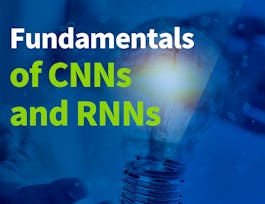Artificial Intelligence is transforming industries by enabling machines to learn from data and make intelligent decisions. This course offers an in-depth exploration of Recurrent Neural Networks (RNN) and Deep Neural Networks (DNN), two pivotal AI technologies.



Introduction to RNN and DNN
This course is part of Deep Learning: Recurrent Neural Networks with Python Specialization

Instructor: Packt - Course Instructors
Sponsored by Taipei Medical University [C4CB]
Recommended experience
What you'll learn
Utilize PyTorch to build and optimize AI models.
Examine the effectiveness of gradient descent and hyperparameter tuning in model optimization.
Develop and apply RNN models for complex tasks such as speech recognition and machine translation.
Details to know

Add to your LinkedIn profile
1 assignment
September 2024
See how employees at top companies are mastering in-demand skills

Build your subject-matter expertise
- Learn new concepts from industry experts
- Gain a foundational understanding of a subject or tool
- Develop job-relevant skills with hands-on projects
- Earn a shareable career certificate


Earn a career certificate
Add this credential to your LinkedIn profile, resume, or CV
Share it on social media and in your performance review

There are 3 modules in this course
In this module, we will introduce you to the course instructor, providing insights into their background and expertise. Additionally, we will outline the primary focus and objectives of the course, setting the stage for your learning journey in AI sciences.
What's included
2 videos2 readings
In this module, we will delve into the diverse applications of Recurrent Neural Networks (RNNs). You will learn to recognize human activities in videos, generate image captions, perform machine translation, and implement speech recognition. We will also explore using RNNs for stock price predictions and determine appropriate scenarios for modeling RNNs.
What's included
7 videos
In this module, we will explore the fundamentals of Deep Neural Networks (DNNs) and their implementation using PyTorch. You will learn about the architecture and representational power of DNNs, understand the importance of activation functions, and get hands-on experience with perceptrons. We will also cover gradient descent techniques, loss functions, and optimization strategies for building and refining DNN models.
What's included
45 videos1 reading1 assignment
Instructor

Offered by
Why people choose Coursera for their career




Recommended if you're interested in Data Science

Sungkyunkwan University

Open new doors with Coursera Plus
Unlimited access to 10,000+ world-class courses, hands-on projects, and job-ready certificate programs - all included in your subscription
Advance your career with an online degree
Earn a degree from world-class universities - 100% online
Join over 3,400 global companies that choose Coursera for Business
Upskill your employees to excel in the digital economy




